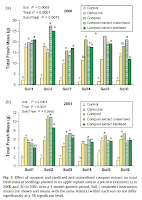 |
| Compost Tea Brewer |
Land-grant universities, like Rutgers NJAES, are mandated to investigate and disseminate verified practices to improve agriculture. We serve growers, new and experienced, by providing up-to-date practices that are reliable and repeatable, profitable, ensure stewardship of the environment, and create higher quality of life for our farmers and the communities surrounding them.
With this mission in mind, let’s look at the evidence regarding the practice of using Aerated Compost Tea specifically for disease suppression in crops.
What is Aerated Compost Tea?
Aerated Compost Tea is not compost leachate, nor compost extract. Compost leachate is a solution leaching from the bottom of compost piles that is not suitable as a foliar spray and is considered a potential pollutant if allowed to run off-site. Compost extract is made from compost suspended in a container of water for period of time, does not contain additives, and is used as a liquid fertilizer.
Aerated Compost Tea is created by putting high quality compost into water and adding nutrients to increase the multiplication of microorganisms present in the compost. Common additives include: molasses, proprietary microbial nutrients, yeast extract and whey blends, kelp meal, blood meal, bone and feather meal, cottonseed meal, fish emulsion, and humic acids. During the brewing process, the solution is aerated with the claim that the environment created favors the growth of beneficial bacteria and fungi at the exclusion of pathogenic microorganisms. At the end of the brewing cycle, the solution containing bacteria, fungi, protozoa, and nematodes is sprayed on the leaf surface of plants, or used as a drench.
The concept of Aerated Compost Tea was developed about 12 years ago in Oregon as a result of study involving organisms found in soil. The concept gained popularity and a small-scale industry of brewing devices and additives grew up centered in the region (Compost Tea Industry Association).
Aerated Compost Tea Claims
Proponents of this practice claim two things:
- that Aerated Compost Tea, “puts the ‘good’ biology where the plant needs it to protect itself. It keeps the plant healthier and helps it to fight off potential diseases. The ‘good’ biology occupies the infection sites on the leaf surface and is held there by simple sugars that the plant puts out (exidates [sic]) that work as a glue to keep the beneficial microorganisms thriving and protecting the plant” (Actively Aerated Compost Tea. Gardening with Microbes. Website accessed Aug. 10, 2012).
- that it is an overall plant health booster, used to provide nutrients for foliar or soil application and as a microbial inoculant to help build soil microbial populations (Aerated Compost Tea. OSU Extension Service. Website accessed Aug. 10, 2012).
In 2004, the National Organic Standards Board Compost Tea Task Force gathered information and presented their findings (National Organic Standards Board Compost Tea Task Force Report 2004). They concluded that they could not endorse Aerated Compost Tea as a recommended practice until studies were done showing efficacy and safety. However, personal communication from users persuaded the Task Force to state that there were recognized benefits of Aerated Compost Tea which included "plant fertility, pest management, and foliar pathogen control." Suslow (2012) summarizes the Task Force recommendations that if teas are used they should be pretested for E. coli if the tea contains nutrient additives, will be used greater than one hour after it is produced, or are to be used on food crops harvested less that 90 days after application.
Since the 2004 Task Force report, reputable researchers, including the Rodale Institute, have not been able to substantiate the disease suppression claims made by proponents of Aerated Compost Tea. In a Rodale/NESARE Grant Summary Report (Hepperly 2005) on the effectiveness of ACT on disease management the researchers stated, “Our research suggests that many of [the] claims on the efficacy of compost tea are exaggerated and cannot be proven out by unbiased research. This lets the farmers and the greater community know that “let the buyer beware” in regards to the claims of product manufacturers.” In addition, they stated their research “substantiates fears of potential danger in ACT related to pathogenic bacteria.”
Since the presentation of findings by the National Organic Standards Board Compost Tea Task Force, there have been no published replicated trials finding Aerated Compost Tea to be effective. There have been studies showing no effect (Russo and Fish 2012, Shrestha et al 2012). A 2009 2-year study in South Africa by L. van Schoor, et al of Apple Replant Disease on six field soils found compost extracts gave highly variable results, with some benefits on marginal soils that were not significantly different from Osmocote fertilizer alone or in combination. This indicates the benefit may be nutritive, not fungicidal. Despite this, Aerated Compost Tea continues to be peddled as a plant disease suppressor and fertilizer.
Does Rutgers NJAES Cooperative Extension recommend the use of Aerated Compost Tea?
We are in agreement with the National Organic Standards Board and the Rodale Institute. Aerated Compost Tea does not meet our requirements for endorsement as a verified reliable repeatable practice for plant disease suppression. While an industry, mainly based in Oregon, has grown up around the practice, unbiased testing does not support its efficacy. Aerated Compost Tea has been studied by reputable researchers and has not been shown to be beneficial. Certainly, growers can produce and use ACT if they so desire; they are free do what they want, including acting on un-supported beliefs. As long as the ACT process does not also culture pathogenic E. coli or Salmonella, using ACT should do no harm other than increasing production costs. However, an agricultural practice that increases production costs without measurably improving outcome is a futile activity and is ultimately unsustainable.

